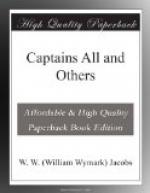Charlie sat there arguing all the evening, but it was no good, and the idea o’ them people sitting there and refusing to let ’im have his own money pretty near sent ’im crazy. It was all ’e could do to kiss Emma good-night, and ’e couldn’t have ’elped slamming the front door if he’d been paid for it. The only comfort he ’ad got left was the Sydney gal’s photygraph, and he took that out and looked at it under nearly every lamp-post he passed.
He went round the next night and ’ad an-other try to get ’is money, but it was no use; and all the good he done was to make Mrs. Cook in such a temper that she ’ad to go to bed before he ’ad arf finished. It was no good talking to old Cook and Emma, because they daren’t do anything without ’er, and it was no good calling things up the stairs to her because she didn’t answer. Three nights running Mrs. Cook went off to bed afore eight o’clock, for fear she should say something to ’im as she’d be sorry for arterwards; and for three nights Charlie made ’imself so disagreeable that Emma told ’im plain the sooner ’e went back to sea agin the better she should like it. The only one who seemed to enjoy it was George Smith, and ‘e used to bring bits out o’ newspapers and read to ’em, showing ’ow silly people was done out of their money.
On the fourth night Charlie dropped it and made ’imself so amiable that Mrs. Cook stayed up and made ’im a Welsh rare-bit for ’is supper, and made ‘im drink two glasses o’ beer instead o’ one, while old Cook sat and drank three glasses o’ water just out of temper, and to show that ’e didn’t mind. When she started on the chandler’s shop agin Charlie said he’d think it over, and when ’e went away Mrs. Cook called ’im her sailor-boy and wished ’im pleasant dreams.
But Charlie Tagg ’ad got better things to do than to dream, and ’e sat up in bed arf the night thinking out a new plan he’d thought of to get that money. When ’e did fall asleep at last ’e dreamt of taking a little farm in Australia and riding about on ’orseback with the Sydney gal watching his men at work.
In the morning he went and hunted up a shipmate of ’is, a young feller named Jack Bates. Jack was one o’ these ’ere chaps, nobody’s enemy but their own, as the saying is; a good-’arted, free-’anded chap as you could wish to see. Everybody liked ’im, and the ship’s cat loved ’im. He’d ha’ sold the shirt off ’is back to oblige a pal, and three times in one week he got ’is face scratched for trying to prevent ’usbands knocking their wives about.
Charlie Tagg went to ’im because he was the only man ’e could trust, and for over arf an hour he was telling Jack Bates all ’is troubles, and at last, as a great favour, he let ’im see the Sydney gal’s photygraph, and told him that all that pore gal’s future ’appiness depended upon ’im.
“I’ll step round to-night and rob ’em of that seventy-two pounds,” ses Jack; “it’s your money, and you’ve a right to it.”




